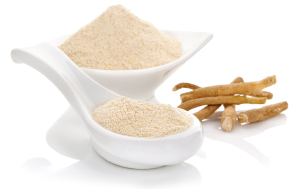
The ASCO Post’s Integrative Oncology series is intended to facilitate the availability of evidence-based information on integrative and complementary therapies sometimes used by patients with cancer. In this installment, Gary Deng, MD, PhD, and Jyothirmai Gubili, MS, present information on Ashwagandha—also known as Indian ginseng—because of the growing interest among the lay public of its restorative effects, which include reductions in fatigue, stress, insomnia, anxiety, and arthritis.

Gary Deng, MD, PhD

Jyothirmai Gubili, MS
Dr. Deng is Medical Director, Integrative Medicine Service; Attending Physician; and Clinical Member, Memorial Sloan Kettering Cancer Center, New York. Ms. Gubili is Editor, Integrative Medicine, Memorial Sloan Kettering Cancer Center, New York.
Scientific Name: Withania somnifera
Common Names: Indian ginseng, winter cherry
Overview
Prevalent in South and Central Asia and in Africa, Ashwagandha is a shrub valued in Ayurveda for its therapeutic effects. Its berries, leaves, and roots are employed in formulations to relieve stress, fatigue, and pain as well as to treat skin diseases, gastrointestinal problems, arthritis, and epilepsy. Ashwagandha is also prescribed as a general tonic to improve overall health and is often referred to as “Indian ginseng.” It is marketed in the form of capsules, tablets, powders, and liquid extracts to relieve stress as well as to rejuvenate and improve endurance.
Clinical data indicate the effectiveness of Ashwagandha in treating osteoarthritis and in relieving anxiety, but it may increase the effects of some sedatives, as well as stimulate the thyroid gland.
The Science
Pharmacologic investigations have shown that active constituents include alkaloids, saponins, and steroidal lactones known as withanolides. The root extracts demonstrated neuroprotective,1 anti-inflammatory, and chondroprotective effects in vitro.2 Studies using animal models indicate immunomodulating3 and radiosensitizing properties;4 enhanced chromosomal stability;5 antidiabetic effects;6 and reversal of beta-amyloid plaque accumulation in a murine model of Alzheimer’s disease.7
OF NOTE
Ashwagandha is widely used in Ayurvedic medicine to treat a variety of health issues, including insomnia, arthritis, and anxiety. Physicians should be aware of the lack of robust clinical data to support claims of benefit as well as the potential for adverse effects and interactions with sedatives.
Data from small clinical studies show that Ashwagandha helps promote growth in children,8 improves sexual performance in adults,9 and has a positive effect on male infertility.10 It was also useful in managing anxiety,11 affecting markers of metabolic syndrome in schizophrenic patients receiving antipsychotic therapy,12 and in improving cognitive function in patients with bipolar disorder.13 An aqueous extract derived from the roots and leaves produced analgesic, anti-inflammatory, and chondroprotective effects in patients with knee joint pain.14 And preliminary findings suggest that Ashwagandha may help improve balance in patients with progressive degenerative cerebral ataxia.15
Preclinical Studies in Cancer Cells
Ashwagandha has also been investigated for potential anticancer effects. In preclinical studies, withanolides were found to be effective in arresting growth of breast, colon, and lung cancer cells16 without affecting normal cells.17 However, they were not useful against drug-resistant cancer stem cells.18 In other studies, Withaferin A, an active constituent, enhanced oxaliplatin activity in pancreatic cancer cells.19 Ashwagandha root extracts were reported to prevent chemotherapy-induced neutropenia in a murine model,20 and to alleviate chemotherapy-induced fatigue along with improving quality of life in a small study of patients with breast cancer. Larger trials are warranted to confirm these findings.21
Mechanistic studies indicate that withanolide sulfoxide, derived from the roots, exerts anti-inflammatory effects by inhibiting COX-2 enzyme and nuclear transcription factor kappa-B.22 The anti-inflammatory activity was shown to be comparable to that of hydrocortisone in mice.23 Ashwagandha also demonstrated antioxidant effects in the brain and tranquilizing effects on the central nervous system,9 likely by influencing GABA receptor function. Triethylene glycol, a compound isolated from the leaves, was identified as an active sleep-inducing component in a murine model, with potential for relieving insomnia.24
Furthermore, compounds derived from Ashwagandha were shown to have proapoptotic effects by induction of reactive oxygen species generation and disruption of mitochondrial function25 and mediation through p53.17 Ashwagandha also repressed proinflammatory gene expression, including interleukin-6 (IL-6), IL-1β, IL-8, heat shock protein 70, and STAT2, and induced p38/MAP-kinase expression in prostate cancer cells.26 In murine models, it was shown to enhance the effects of radiation therapy27 and to reverse neutropenia induced by paclitaxel.20
Adverse Reactions: Case Reports
A 32-year-old woman developed thyrotoxicosis after taking Ashwagandha capsules for chronic fatigue. Her symptoms resolved after discontinuing the capsules.28
A 28-year-old man experienced burning, itching, and discoloration of skin/mucous membrane following ingestion of Ashwagandha for decreased libido. Symptoms improved with conventional treatment.29
Nausea, headache, and gastritis have also been reported in a study but were managed with standard therapies.14
Herb-Drug, Lab Interactions
Triazolam: Ashwagandha may increase the sedative effects.30
It may cause a false spike in digoxin immunoassay.31
It may elevate thyroxine levels.32
Summary
Limited clinical evidence indicates that Ashwagandha can help relieve osteoarthritis and anxiety, but supplementation is not advisable for patients on sedatives. ■
DISCLOSURE: Dr. Deng and Ms. Gubili reported no conflicts of interest.
REFERENCES
1. Kumar S, Harris RJ, Seal CJ, et al: An aqueous extract of Withania somnifera root inhibits amyloid b fibril formation in vitro. Phytother Res 26:113-117, 2012.
2. Sumantran VN, Chandwaskar R, Joshi AK, et al: The relationship between chondroprotective and antiinflammatory effects of Withania somnifera root and glucosamine sulphate on human osteoarthritic cartilage in vitro. Phytother Res 22:1342-1348, 2008.
3. Davis L, Kuttan G: Effect of Withania somnifera on CTL activity. J Exp Clin Cancer Res 21:115-118, 2002.
4. Devi PU: Withania somnifera Dunal (Ashwagandha): Potential plant source of a promising drug for cancer chemotherapy and radiosensitization. Indian J Exp Biol 34:927-932, 1996.
5. Prakash J, Gupta SK, Dinda AK: Withania somnifera root extract prevents DMBA-induced squamous cell carcinoma of skin in Swiss albino mice. Nutr Cancer 42:91-97, 2002.
6. Anwer T, Sharma M, Pillai KK, et al: Effect of Withania somnifera on insulin sensitivity in non-insulin-dependent diabetes mellitus rats. Basic Clin Pharmacol Toxicol 102:498-503, 2008.
7. Sehgal N, Gupta A, Valli RK, et al: Withania somnifera reverses Alzheimer’s disease pathology by enhancing low-density lipoprotein receptor-related protein in liver. Proc Natl Acad Sci U S A 109:3510-3515, 2012.
8. Mishra RK, Trivedi R, Pandya MA: A clinical study of Ashwagandha ghrita and Ashwagandha granules for its Brumhana and Balya effect. Ayu 31:355-360, 2010.
10. Ahmad MK, Mahdi AA, Shukla KK, et al: Withania somnifera improves semen quality by regulating reproductive hormone levels and oxidative stress in seminal plasma of infertile males. Fertil Steril 94:989-996, 2010.
11. Cooley K, Szczurko O, Perri D, et al: Naturopathic care for anxiety: A randomized controlled trial ISRCTN78958974. PLoS One 4:e6628, 2009.
12. Agnihotri AP, Sontakke SD, Thawani VR, et al: Effects of Withania somnifera in patients of schizophrenia: A randomized, double blind, placebo controlled pilot trial study. Indian J Pharmacol 45:417-418, 2013.
13. Chengappa KN, Bowie CR, Schlicht PJ, et al: Randomized placebo-controlled adjunctive study of an extract of Withania somnifera for cognitive dysfunction in bipolar disorder. J Clin Psychiatry 74:1076-1083, 2013.
14. Ramakanth GS, Uday Kumar C, Kishan PV, et al: A randomized, double blind placebo controlled study of efficacy and tolerability of Withaina somnifera extracts in knee joint pain. J Ayurveda Integr Med 7:151-157, 2016.
15. Sriranjini SJ, Pal PK, Devidas KV, et al: Improvement of balance in progressive degenerative cerebellar ataxias after Ayurvedic therapy: A preliminary report. Neurol India 57:166-171, 2009.
16. Jayaprakasam B, Zhang Y, Seeram NP, et al: Growth inhibition of human tumor cell lines by withanolides from Withania somnifera leaves. Life Sci 74:125-132, 2003.
17. Widodo N, Kaur K, Shrestha BG, et al: Selective killing of cancer cells by leaf extract of Ashwagandha: Identification of a tumor-inhibitory factor and the first molecular insights to its effect. Clin Cancer Res 13:2298-2306, 2007.
18. Maliyakkal N, Appadath Beeran A, Balaji SA, et al: Effects of Withania somnifera and Tinospora cordifolia extracts on the side population phenotype of human epithelial cancer cells: Toward targeting multidrug resistance in cancer. Integr Cancer Ther 14:156-171, 2015.
19. Li X, Zhu F, Jiang J, et al: Synergistic antitumor activity of withaferin A combined with oxaliplatin triggers reactive oxygen species-mediated inactivation of the PI3K/AKT pathway in human pancreatic cancer cells. Cancer Lett 357:219-230, 2015.
20. Gupta YK, Sharma SS, Rai K, et al: Reversal of paclitaxel induced neutropenia by Withania somnifera in mice. Indian J Physiol Pharmacol 45:253-257, 2001.
21. Biswal BM, Sulaiman SA, Ismail HC, et al: Effect of Withania somnifera (Ashwagandha) on the development of chemotherapy-induced fatigue and quality of life in breast cancer patients. Integr Cancer Ther 12:312-322, 2013.
22. Mulabagal V, Subbaraju GV, Rao CV, et al: Withanolide sulfoxide from Aswagandha roots inhibits nuclear transcription factor-kappa-B, cyclooxygenase and tumor cell proliferation. Phytother Res 23:987-992, 2009.
23. al-Hindawi MK, al-Khafaji SH, Abdul-Nabi MH: Anti-granuloma activity of Iraqi Withania somnifera. J Ethnopharmacol 37:113-116, 1992.
24. Kaushik MK, Kaul SC, Wadhwa R, et al: Triethylene glycol, an active component of Ashwagandha (Withania somnifera) leaves, is responsible for sleep induction. PLoS One 12:e0172508, 2017.
25. Malik F, Kumar A, Bhushan S, et al: Reactive oxygen species generation and mitochondrial dysfunction in the apoptotic cell death of human myeloid leukemia HL-60 cells by a dietary compound withaferin A with concomitant protection by N-acetyl cysteine. Apoptosis 12:2115-2133, 2007.
26. Aalinkeel R, Hu Z, Nair BB, et al: Genomic analysis highlights the role of the JAK-STAT signaling in the anti-proliferative effects of dietary flavonoid: ‘Ashwagandha’ in prostate cancer cells. Evid Based Complement Alternat Med 7:177-187, 2010.
27. Devi PU, Sharada AC, Solomon FE: In vivo growth inhibitory and radiosensitizing effects of withaferin A on mouse Ehrlich ascites carcinoma. Cancer Lett 95:189-193, 1995.
28. van der Hooft CS, Hoekstra A, Winter A, et al: [Thyrotoxicosis following the use of ashwagandha]. Ned Tijdschr Geneeskd 149:2637-2638, 2005.
29. Sehgal VN, Verma P, Bhattacharya SN: Fixed-drug eruption caused by ashwagandha (Withania somnifera): A widely used Ayurvedic drug. Skinmed 10:48-49, 2012.
30. Kumar A, Kulkarni SK: Effect of herbals on sleep and their interactions with hypnotic drugs. Indian J Pharm Sci 67:391-393, 2005.
31. Dasgupta A, Tso G, Wells A: Effect of Asian ginseng, Siberian ginseng, and Indian ayurvedic medicine Ashwagandha on serum digoxin measurement by Digoxin III, a new digoxin immunoassay. J Clin Lab Anal 22:295-301, 2008.
32. Gannon JM, Forrest PE, Roy Chengappa KN: Subtle changes in thyroid indices during a placebo-controlled study of an extract of Withania somnifera in persons with bipolar disorder. J Ayurveda Integr Med 5:241-245, 2014.

